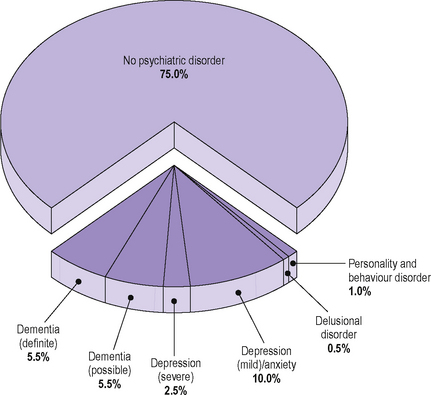It is important that the carers, who are often family members, are supported. This can include arranging regular respite inpatient admissions for the patient. Community psychiatric nurses may work from a local hospital or general practice health centre and can offer help and support to both patients and their carers, while liaising with psychiatrists and general practitioners. Patients should be seen regularly by an optician. Cataracts and glaucoma should be detected early. Dental health is also important as many elderly patients have no natural teeth or otherwise have poor dental health; some wear unsatisfactory dentures that need replacing. For those who cannot look after their own feet, chiropodists provide an important service. Occupational therapy is helpful in assessing and encouraging the potential abilities of the patient. By visiting the patient at home, an occupational therapist can give valuable advice on adaptations and equipment that can help with dressing, washing, toileting and preparing meals. Physiotherapists can help with mobility, as well as muscle- and joint-related pain relief. In addition to working in hospitals they can visit patients in the community. Continence advisors (nurses with an expertise in continence problems) are able to assess, advise and in some cases treat, urinary and faecal incontinence. In cases in which a patient has a mother tongue different from that of the country in which they live, the professional help of a trained interpreter can be invaluable. In many countries patients are eligible for benefits, and application should be made for these.
Attendance at a day hospital can be very helpful for both patients and their carers. In Britain, day hospitals for the elderly are run as multidisciplinary teams, including medical staff, nursing staff, occupational therapists, physiotherapists and social workers. They may also include or facilitate access to other professionals, such as opticians, dentists, chiropodists, pharmacists, speech therapists and interpreters. Patients may typically attend twice each week, with transport between the day hospital and home being provided. Local authorities in Britain also run day centres, which aim to provide companionship rather than treatment and rehabilitation.
The patient’s own name, the time, and date and location are reinforced using reality orientation. Staff frequently talk with the patient in a way that is orientating. A large clock with easily read hands is placedin each room, and there may be a board with the current date in large type.
Memories from the distant past are usually the last to be affected by dementing processes. This can be made use of in reminiscence therapy, in which music from that era is played and patients, in groups, are encouraged to remember events and the names of commonly available goods and the like from that age, perhaps with the aid of memorabilia.
A number of non-statutory voluntary agencies are also available that can provide a valuable source of support both to the patient and carers. In Britain, such organizations include Age Concern, the Alzheimer’s Disease Society, Help the Aged, and Citizens Advice Bureaux. Local schemes include sitting services, visiting and befriending groups, sheltered housing schemes, and talking newspaper and book services.
Eventually, as the dementing process continues, the patient will probably need sheltered accommodation or a long-stay inpatient ward. In Britain, old people’s homes are the responsibility of the social services department, and are also known as residential homes or Part III accommodation (after Part III of the National Assistance Act 1948). More recently, the British government has been encouraging social services to use private homes.
As mentioned in Chapter 3, cognitive enhancers, including the anticholinesterase inhibitors donepezil, rivastigmine and galantamine, and the non-competitive NMDA antagonist memantine may be used for cognitive enhancement in dementia. However, in the UK treatment with these drugs should be started and supervised by an experienced specialist in this area. Cognitive assessment is repeated at around three months and, if the patient is not responding, the drug should be discontinued. Many specialists repeat the cognitive assessment four to six weeks after discontinuation to confirm lack of deterioration. Donepezil and galantamine may be used in mild to moderate dementia in Alzheimer’s disease. Rivastigmine may be prescribed in mild to moderate dementia in Alzheimer’s disease and in Parkinson’s disease. Only memantine is licensed in the UK to be prescribed in moderate to severe dementia in Alzheimer’s disease.









